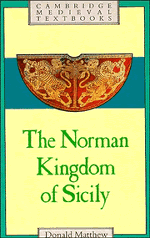Book contents
- Frontmatter
- Contents
- List of abbreviations
- Note on coinage
- Map of Sicily and Southern Italy
- Acknowledgements
- Introduction
- Part I The Normans and the monarchy
- Part II The kingdom
- 3 The material resources of the kingdom
- 4 The religious communities of the kingdom
- 5 Intellectual and artistic aspects of the kingdom
- 6 The ordering of society
- Part III The monarchy
- Part IV The Norman legacy
- Further reading
- Index
- Cambridge Medieval Textbooks
5 - Intellectual and artistic aspects of the kingdom
Published online by Cambridge University Press: 05 June 2012
- Frontmatter
- Contents
- List of abbreviations
- Note on coinage
- Map of Sicily and Southern Italy
- Acknowledgements
- Introduction
- Part I The Normans and the monarchy
- Part II The kingdom
- 3 The material resources of the kingdom
- 4 The religious communities of the kingdom
- 5 Intellectual and artistic aspects of the kingdom
- 6 The ordering of society
- Part III The monarchy
- Part IV The Norman legacy
- Further reading
- Index
- Cambridge Medieval Textbooks
Summary
The mixture of religions and cultures found in the twelfth-century southern kingdom has excited the interest and admiration of the modern imagination. Attention has been focused on such extraordinary buildings as the royal palace–chapel in Palermo, where the talents of craftsmen from different artistic traditions were put to work for the king's glory. Contemporary visitors to the kingdom, who found their own reasons to marvel, did not, however, comment on the attractions offered by a cosmopolitan society. Those who actually lived in the kingdom were more aware of the mutual antipathies of the various groups than of the potential advantages of a cultural mix. The Latins had the political mastery; in time the culture of their group prevailed throughout the kingdom. Muslim culture in Sicily not surprisingly went under first, for difference of religion made Muslims unassimilable in the long term. By the end of the twelfth century, they felt sufficiently alienated to take to open rebellion against Latin authority. Frederick II dealt ruthlessly with Muslim rebels and deported many of them to Lucera on the mainland, and at the end of the thirteenth century, the last surviving community was broken up and sold off into slavery. The Greeks were never persecuted in a comparable way: as Christians who accepted Roman ecclesiastical authority their differences could be accommodated. In the end, however, they too were submerged in a predominantly Latin environment.
- Type
- Chapter
- Information
- The Norman Kingdom of Sicily , pp. 112 - 128Publisher: Cambridge University PressPrint publication year: 1992



